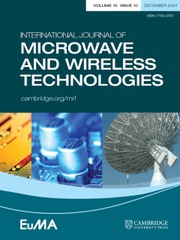Crossref Citations
This article has been cited by the following publications. This list is generated based on data provided by
Crossref.
Reed, Graham T.
Knights, Andrew P.
Tegegne, Z. G.
Viana, C.
Polleux, J. L.
Grzeskowiak, M.
and
Richalot, E.
2016.
Improving the opto-microwave performance of SiGe/Si phototransistor through edge-illuminated structure.
Vol. 9752,
Issue. ,
p.
975219.
Tegegne, Zerihun Gedeb
Viana, Carlos
Polleux, Jean-Luc
Grzeskowiak, Marjorie
and
Richalot, Elodie
2018.
Intrinsic Frequency Response of Silicon–Germanium Phototransistor Associated With 850-nm Multimode Fiber.
IEEE Transactions on Electron Devices,
Vol. 65,
Issue. 6,
p.
2537.
Kumar, Harshvardhan
and
Basu, Rikmantra
2019.
Effect of Active Layer Scaling on the Performance of Ge1–x
Sn
x
Phototransistors.
IEEE Transactions on Electron Devices,
Vol. 66,
Issue. 9,
p.
3867.
Liu, Xian-Cheng
Ma, Jia-Jun
Xie, Hong-Yun
Ma, Pei
Chen, Liang
Guo, Min
and
Zhang, Wan-Rong
2020.
Effects of buried oxide layer on working speed of SiGe heterojunction photo-transistor*.
Chinese Physics B,
Vol. 29,
Issue. 2,
p.
028501.
Bennour, Alae
Polleux, J. L.
Algani, C.
Tegegne, Z. G.
and
Mazer, S.
2020.
Electrical Compact Modeling of SiGe Phototransistor: Impact of the Distributed Nature on Dynamic Behavior.
IEEE Transactions on Electron Devices,
Vol. 67,
Issue. 3,
p.
1034.
Sha, Yin
Xie, Hongyun
Wang, Yan
Xiang, Yang
Zhu, Fu
Ji, Ruilang
Na, Weicong
and
Zhang, Wanrong
2022.
A Novel SiGe Heterojunction Phototransistor Applicable in Wide Spectral Range.
p.
1.
Xie, Hongyun
Xiang, Yang
Sha, Yin
Ji, Ruilang
Zhu, Fu
Shen, Xiaoting
Han, Dong
Yang, Xiaoxiong
and
Zhang, Wanrong
2022.
A SiGe/Si Phototransistor With High FOM of Gain*VA
Using 0.35-μm BiCMOS Technology.
IEEE Transactions on Electron Devices,
Vol. 69,
Issue. 10,
p.
5612.
Sha, Yin
Xie, Hongyun
Xiang, Yang
Ji, Ruilang
Zhu, Fu
Shen, Xiaoting
Na, Weicong
Jin, Dongyue
and
Zhang, Wanrong
2022.
High-Efficiency SiGe/Si Heterojunction Phototransistor With Photon- Trapping Nanoholes Operating at 600–1000-nm Wavelength.
IEEE Transactions on Electron Devices,
Vol. 69,
Issue. 5,
p.
2514.
Xie, Hongyun
Shen, Xiaoting
Ge, Yunpeng
Xu, Zimai
Liu, Ziming
Ma, Yudong
Na, Weicong
Jin, Dongyue
and
Zhang, Wanrong
2024.
A SiGe/Si Heterojunction Phototransistor for High Sensitivity Light Detection.
IEEE Transactions on Electron Devices,
Vol. 71,
Issue. 11,
p.
6857.
Shen, Xiaoting
Xie, Hongyun
Han, Dong
Ge, Yunpeng
Yang, Xiaoxiong
Xu, Zimai
Na, Weicong
Jin, Dongyue
and
Zhang, Wanrong
2024.
Optimum Ge Profile Design for High-Response SiGe/Si Heterojunction Phototransistor Applicable in Wide Spectral Range of 400–1000 nm.
IEEE Transactions on Electron Devices,
Vol. 71,
Issue. 1,
p.
656.
Hosseinzadeh, Mozhgan
Frounchi, Milad
Tzintzarov, George N.
Teng, Jeffrey W.
and
Cressler, John D.
2024.
High-Performance SiGe Heterojunction Phototransistor in a Commercial SiGe BiCMOS Platform for Free-Space Optical Receivers.
p.
18.
Thary, V.
Algani, C.
Chevalier, P.
and
Polleux, J.-L.
2025.
Low-Cost and Low-Voltage Si/SiGe Phototransistor With High Responsivity at 900nm for Microwave Photonics Applications.
IEEE Electron Device Letters,
Vol. 46,
Issue. 2,
p.
239.


